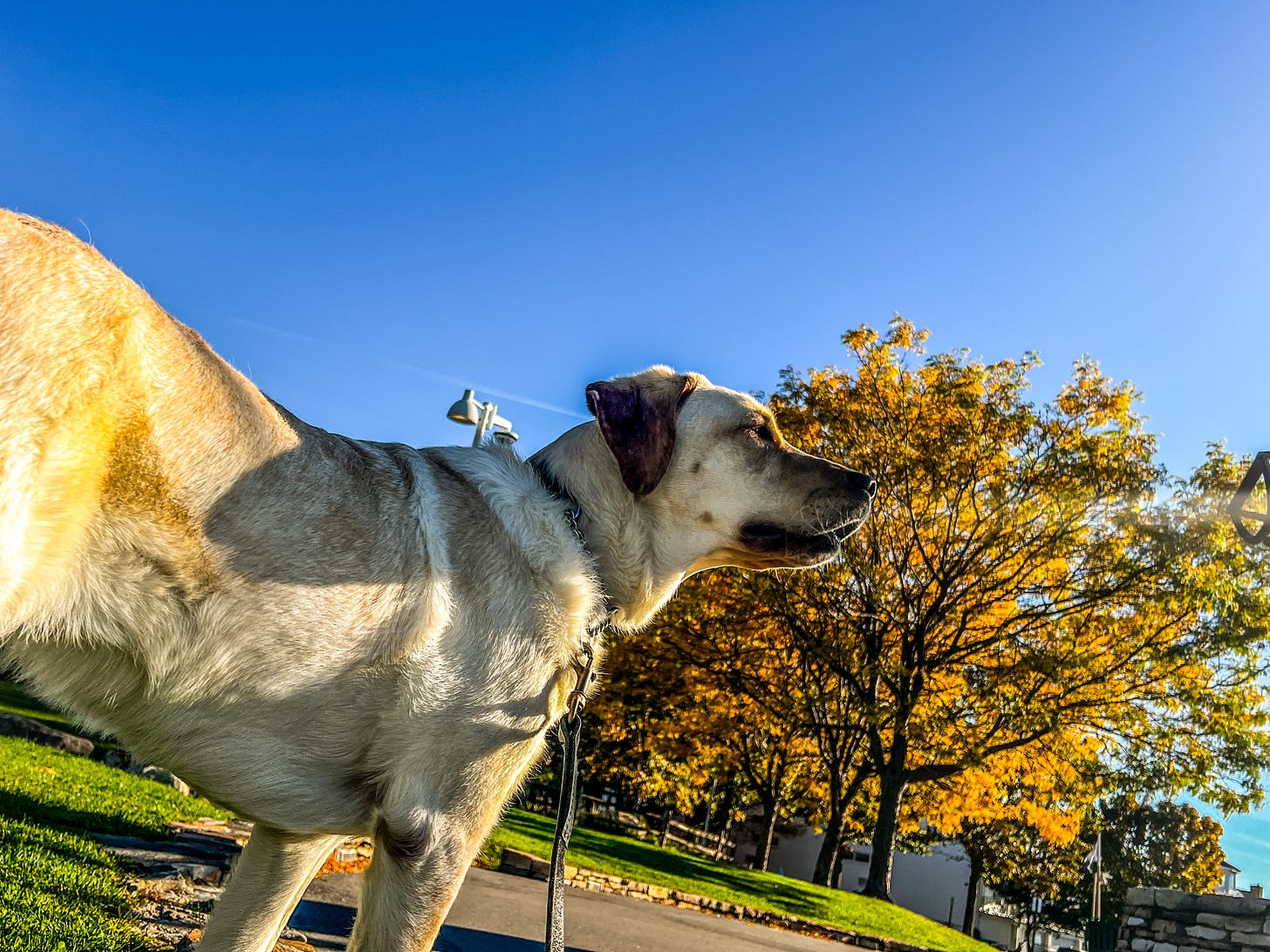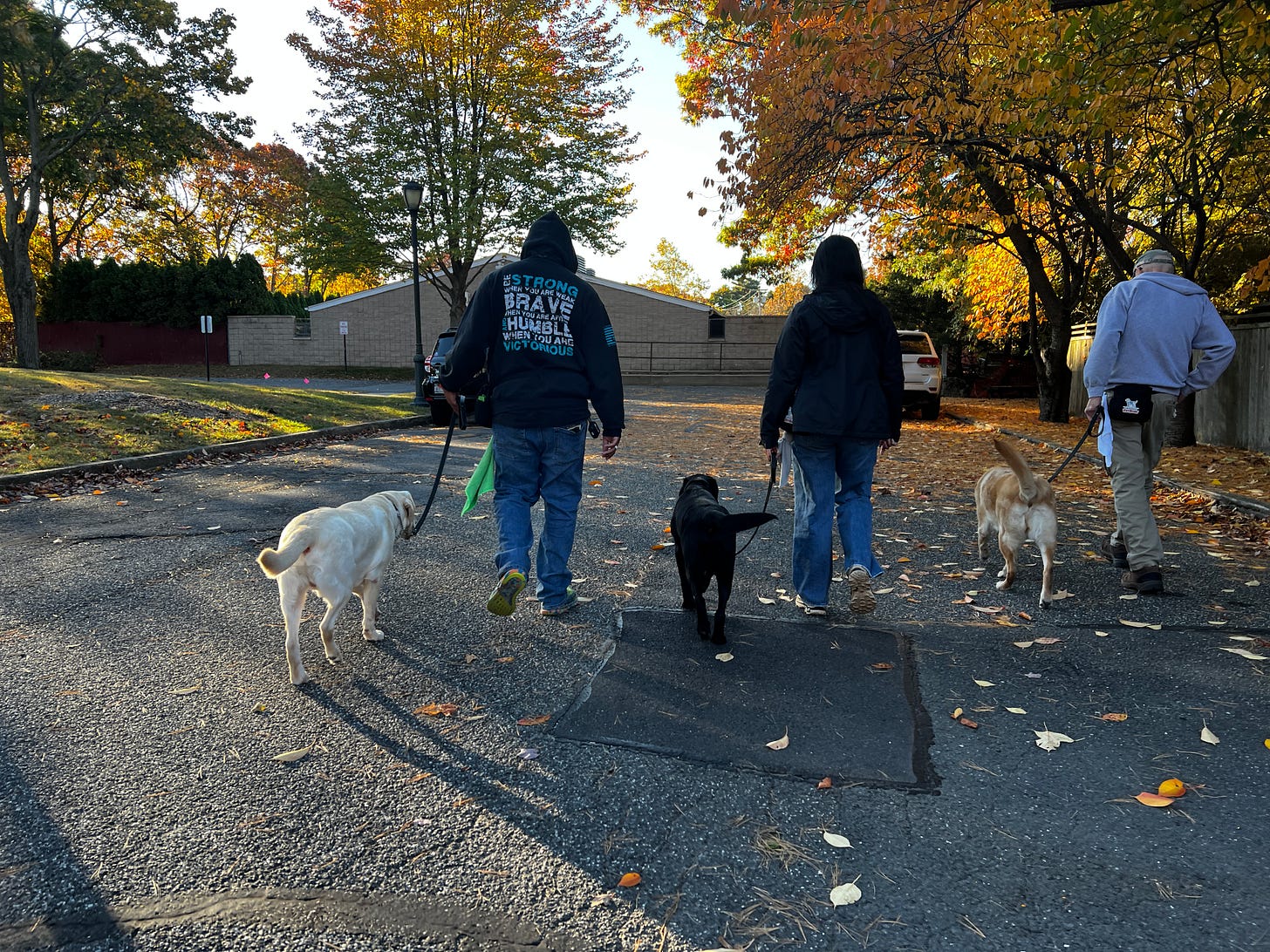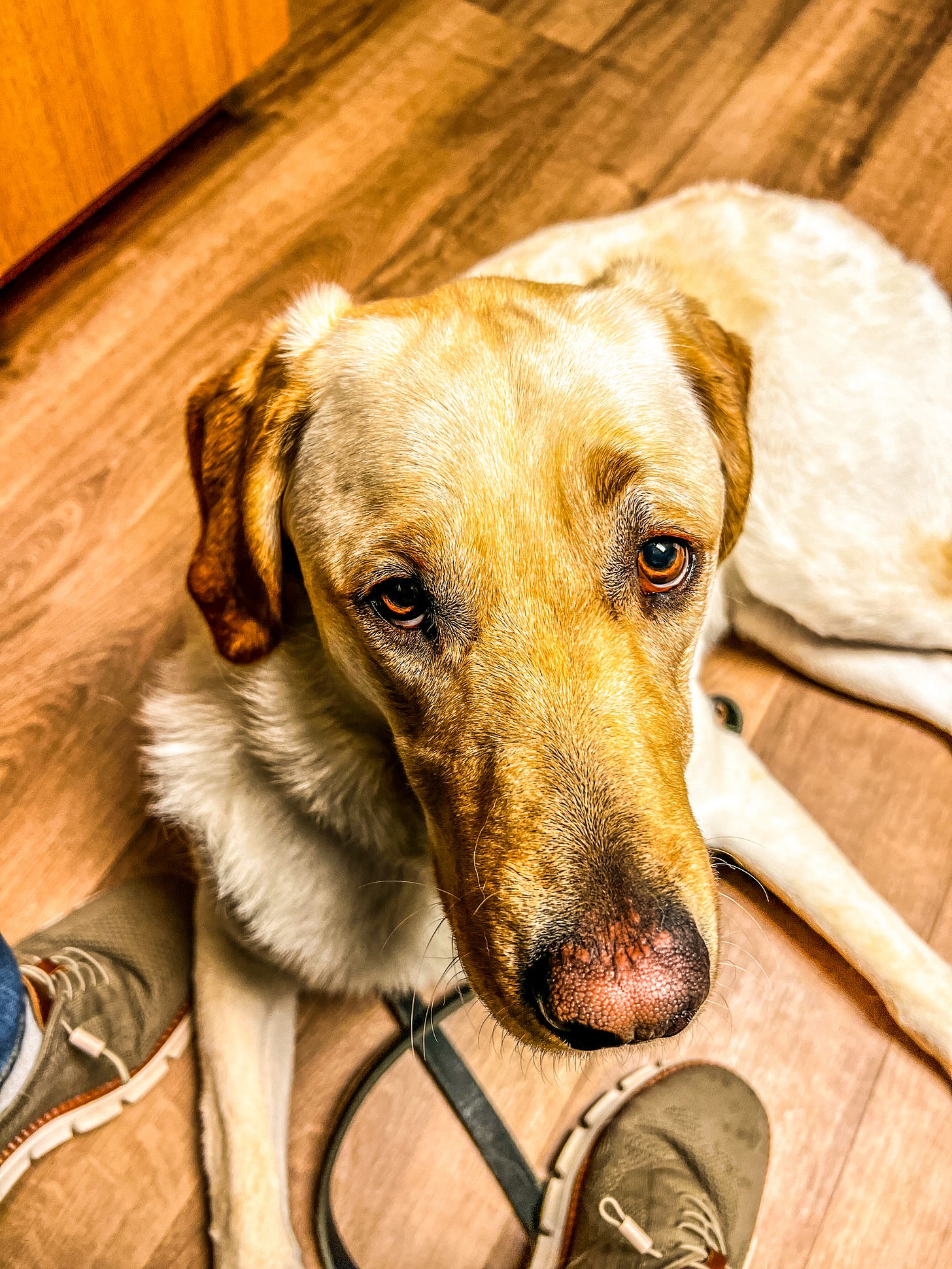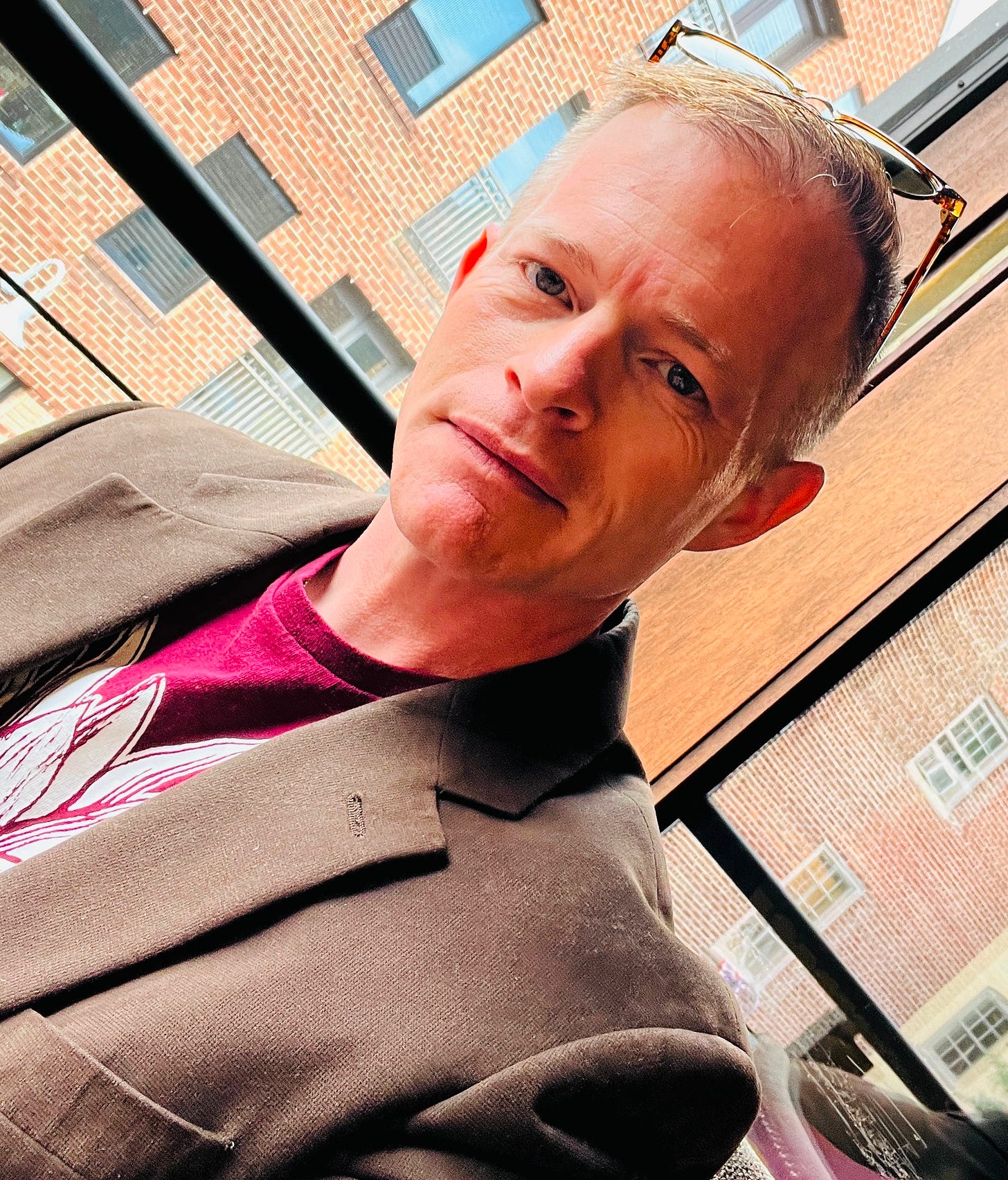About This Series
After a long, silent battle, I finally admitted I needed help. Years after my last deployment to Iraq, I began treatment for severe PTSD. Somewhere along the way, I was recommended for a service dog through a program run by the U.S. Department of Defense. I agreed—almost passively—to be placed on the waiting list.
Two years later, I got the call.
This series documents what happened next: the process of receiving, training with, and ultimately becoming certified with my service dog, Spirit. It was written in real time, during the training itself and in the immediate months that followed.
I’m sharing this journey in the hopes that it might help someone else. The doubts are real. The feelings are raw. This is what healing actually looks like—messy, humbling, and full of unexpected grace.
If this resonates with you, or you know someone who might benefit from reading it, please consider sharing it with them using the button below.
New episodes are published every Monday at 10am eastern.
The early autumn morning unfolded like a watercolor—soft, cool, and muted around the edges. In this sleepy Long Island town, the air was hushed and heavy with a gentle mist, the kind that lingers like a sigh before the day exhales. The grass beneath our feet was still a vivid green, wet with dew that clung to the tips like tiny glass beads, soaking the soles of my boots as Spirit padded silently beside me.
Golden light began to filter through the thinning canopy, casting long, dappled shadows across the cracked sidewalks and quiet lawns. The leaves had begun their annual transformation—some still green with the stubbornness of late summer, others a brilliant mosaic of fire: crimson, rust, amber, and gold. They drifted lazily from the trees like slow-falling confetti, decorating the ground with quiet celebration.
The air smelled of damp earth and fallen leaves, tinged with the faintest trace of woodsmoke from a distant chimney. There was the clean, mineral scent of fog, too—the kind that makes you inhale deeply without realizing you’ve been holding your breath for days.
Somewhere nearby, a robin sang a clear, three-note call, joined in soft intervals by the staccato chirp of sparrows and the mournful coo of a mourning dove. These morning songs didn’t compete with one another. They blended gently, like a choir tuning up for the day. And in that silence—broken only by birdsong and the rhythmic breath of the dog at my side—I felt something stir.
Not peace, exactly, but hope for whatever this day would be.
Small Victories, Big Shifts
This facility doesn’t offer therapy, at least not in the traditional sense. No one here is asking probing questions or unpacking childhood wounds. We don’t sit in circles and bare our souls on command. But as the days go on, the truth still leaks out. Some wounds are visible—mobility challenges, hearing loss, injuries etched into bodies that have carried too much. Others are less obvious but no less real. PTSD. Depression. Isolation. Guilt. The silent battles that leave no outward scars. But just because we don’t speak about them openly as a rule, our shared struggle still has a way of speaking for us.
Many of us have slowly begun to open up to one another and share our struggles. Little by little, fragments of stories have emerged—details about diagnoses, deployments, breakdowns. But no matter the branch of service or the severity of the disability, all of the students here are here for one reason: to regain something that was lost. Confidence. Stability. Independence. Hope.
The training is demanding. These dogs are brilliant, but they’re not turnkey machines. They need direction, discipline, and consistency. So do we. Learning to work as a team takes time, and failure is a daily occurrence. But the instructors—calm, seasoned, steady—never waver. They’ve walked hundreds of people and dogs through this process before. Their patience is inexhaustible. They are our coaches. Our quiet counselors. The dogs, whether they know it or not, are our therapy.
From a distance, Spirit and I watched today as something remarkable unfolded. The handlers—the men and women I’ve come to quietly admire—began to soften. There was laughter. Smiles. Encouragement. Gone were the tight-lipped grimaces of frustration. In their place: warmth, connection, joy. A kind of thaw was happening—each dog slowly coaxing their partner back into the light.
One by one, we began to have small victories. Dogs started passing one another without sniffing or barking. They sat on command, turned corners in sync, resisted temptations like squirrels and birds and the distant voice of an instructor calling another team’s name. The breakthrough came just before lunch, when a voice rang out like a cannon blast across the simulated village green.
Good boy, Jake! That-a-boy! You did it, brother! YOU DID IT!
It was one of our classmates—a massive Vietnam-era Marine, all barrel chest and gravel-thick beard—celebrating with unrestrained joy. His dog, Jake, had finally gotten something right after two full days of total chaos. The sound of that voice—thunderous, proud, unguarded—brought the entire class to a halt. Cheers rang out from every corner. You’d have thought we’d just won the Super Bowl.
And in a way, we had.
That single breakthrough became a catalyst for the rest of us. I could feel the shift. One team’s win sparked another’s. By the time we headed inside for more lectures, a new energy pulsed through the group. A new confidence was growing in all of us.
The Hands That Raised Her
Later that evening, after dinner and the last bathroom break, we were given something unexpected: an opportunity for connection.
Every dog matched with a handler has undergone two full years of training. That process begins when the puppies are just eight weeks old. Some are placed directly into the homes of volunteer puppy raisers. Others, like my dog Spirit, begin their journey in an unlikely place: a federal penitentiary.
That’s right—Spirit spent the first year of her life being raised in prison!
It sounds improbable at first. But the more I learned, the more it made sense. These programs—there were 32 active prisons participating at the time of my training—give incarcerated individuals the opportunity to raise and train service dogs under close supervision. Prisoners must meet specific criteria to qualify, and once accepted, they receive instruction on how to care for and train a puppy. From Monday to Friday, they are responsible for every aspect of that dog’s development—feeding, grooming, housebreaking, basic commands, and constant companionship.
I watched a documentary about these programs after learning that many of the dogs in our class had been trained this way. In it, several inmates spoke candidly about how raising a puppy gave them their first true sense of purpose in years. For many, it was the first time they had ever nurtured something—ever been trusted to protect and guide a life other than their own. The dogs, in turn, were given unwavering attention, structure, and a bond born of quiet devotion. In a place designed for confinement, the work of freedom had quietly begun.
On weekends, the dogs leave the prison and are placed with volunteer puppy raisers who continue their training. These volunteers aren’t just responsible for obedience—they must also expose the dogs to every kind of environment imaginable. Baseball games. Shopping malls. Airports. Subways. Restaurants. Schools filled with the unpredictable chaos of children. The goal is to create a dog that remains calm and focused no matter what’s happening around them.
This morning, I found out that Spirit spent her weekends with two sisters who live just minutes from where I was born in Massachusetts. For more than a year, these two sisters gave their time, their energy, and their love to this process—with no expectation of reward. They knew they’d likely never meet the person who would one day need this dog. They did it anyway.
That person turned out to be me.
Each person who shaped Spirit gave her something I never could have on my own: discipline, exposure, compassion, constancy. Every step she took in those two years was preparing her to take the next steps with me. From prison corridors to crowded sidewalks, she was learning to stay steady. Learning to listen. Learning to trust. And in the process, she was becoming the dog who would one day help me reclaim my life.
So when I was told we’d have a chance to speak with our dogs’ puppy raisers that evening, I knew it would be more than just a phone call.
I knew it would be sacred.
When Hope Meets Its Destination
After a full day of lectures, walks, and field visits to noisy public spaces, Spirit and I returned to our quiet room for the night. The routine was beginning to settle in, though it still felt anything but routine. I sat at the small desk pressed against the far wall on my dorm room, my laptop open in front of me, prepared to take notes during the call. Spirit curled up underneath, her chin resting gently on my feet.
The air was still. Outside, dusk had melted into the kind of dark that feels thick and endless in small towns. The kind of dark where you start to notice things—your breath, your heartbeat, your thoughts.
I sat there, waiting for the phone to ring, and found myself caught in the strange elasticity of time. It had only been a week since I arrived here, but it felt like a month. Each day had been so full, so packed with newness and challenge and quiet reckoning, I could no longer remember what life felt like before I came. I tried to conjure the familiar rhythms of home—morning coffee, Spirit-less walks, the quiet loneliness I’d grown used to—but they felt far away, like someone else’s life. At the same time, I couldn’t see past the next few days. The future—what home might feel like with Spirit by my side—was just as blurry.
It was in that soft, flickering uncertainty that the doubts began to rise.
Do I deserve this?
Can I really handle the responsibility?
What if I fail her?
What if I’m too broken for this to work?
What if nothing changes?
What if everything does?
These weren’t new questions. They were old companions, resurfacing now that the adrenaline had faded and routine had taken hold. Mountains of doubt blocked the horizon of my mind. And yet, beneath my desk, Spirit exhaled one long, steady breath. Grounding me.
She didn’t know my questions. But somehow, she was already helping me answer them.
Then, suddenly, the phone rang.
The women on the other end of the line sounded like home. Their South Shore Boston accents rolled through the phone like warm flannel—soft, familiar, and full of character. It was the kind of cadence you don’t just hear; you feel it settle into your chest. Both women were in their sixties—sisters, I would learn—speaking to me from the same house they’d raised Spirit in every weekend for more than a year. A house not far from where I myself had entered the world.
They told me about the rhythms of their weekends with Spirit. Every Friday afternoon, they’d drive thirty minutes to pick her up from the prison where Spirit spent her weekdays. The transition was seamless, they said—she’d hop in the car like she already knew she was loved. They’d spend the weekend taking Spirit around to ball games or shopping malls. They took her to family gatherings, movie theaters, Thanksgiving dinner in another state—anything to broaden Spirit’s understanding and familiarity with the world around her. On Sunday evenings, they returned her, hearts tugging just a little each time. They weren’t allowed much insight into the prison side of the program. That was walled off. But the sisters took their role seriously. They knew their job was to prepare Spirit for the world as a working dog, so they brought the world to her.
The sisters told me about trips they took to fairs, neighborhood cookouts, kids’ soccer games. They navigated busy grocery store aisles and noisy train stations. They boarded planes, crossed turnstiles, and climbed into crowded elevators. Spirit learned to sit quietly beneath metal bleachers, to stay calm during fireworks, to ignore distractions in grocery aisles and airports and elementary schools filled with squealing children. They exposed her to chaos so she could one day bring calm.
They did all of this as volunteers. For free. Week after week. With no promise of recognition. With only the hope—just the hope—that someone, somewhere, someday might benefit from receiving this dog. And if everything went right, these two sisters knew they would have played a small part in that person’s healing.
They worked so hard on my behalf, and they never even knew who I was. But now, we were talking to one another. And the more we spoke, the more obvious it became that we both knew this was a profound meeting.
“We always wonder what happens to the dogs… who they go to… and now we know,” one of them said softly, her voice catching on the edge of a sob.
I wanted to say something profound, something that could carry the weight of all I felt in that moment—but all I said was, It’s a lot to take in… it’s very humbling.
That’s all I could manage. And then, I broke.
Tears came fast—huge, heaving sobs that tore through me before I even had the chance to resist. Days of fatigue, anxiety, and overstimulation had worn me thin, but it wasn’t exhaustion that broke me. It was grace. It was the unbearable weight of realizing that these women—complete strangers—had given a year of their lives for someone they would likely never meet. And that someone turned out to be me.
Their devotion, their sacrifice, their quiet, steadfast love for a dog they raised in faith—it undid me. It reached into places in me I had kept locked and numb for years, and it cracked them wide open. The humility I felt wasn’t just intellectual—it was bodily. It knocked the breath out of me.
On the other end of the line, they were crying too. Their voices softened, trembled, cracked. And in that fragile, sacred space between us, we dropped everything else. No small talk. No smoothing of emotion. No false composure. We simply stayed in the moment, raw and honest, our tears forming a kind of bridge.
We were no longer strangers. We were co-conspirators in something holy. Bound not by shared pasts, but by shared purpose—each of us having played our part in something far greater than ourselves.
I don’t know what to say, I whispered, my voice cracking.
You don’t have to say a thing, Eric. You don’t have to say a thing was all they could say in response.
Our tears weren’t sad. They were reverent.
Born of sacrifice and grace.
Born of time spent offering love to something you may never see fulfilled.
We were all quiet for a time, sniffling and wiping our eyes.
They told me they’d be attending graduation in person at the facility in just a few days.
We’ll find you, one of them said through tears. We can’t wait to see Spirit… and you.
I’ll see you there, I whispered, still wiping my face.
And I knew—when we met in a few days, we would cry again. Not from pain, but from recognition. From the quiet knowing that my healing began even before I realized it. My healing had been in the works for years, just waiting to be received… until I was ready.
That night, I collapsed into bed—emotionally gutted but spiritually overflowing. I whispered words of thanks into the dark, unable to contain the swell of gratitude that had taken root inside me. Tears pooled onto my pillow. Spirit was already asleep on her bed, her slow breath the only sound in the room.
And for the first time since arriving, I felt a shift.
Somehow, I knew I was going to be okay.
About The Author
ES Vorm, PhD is a former corpsman with the US Marine Corps, now a defense scientist specializing in human performance and human-machine teaming. After two decades of service—including deployments to Iraq—he was diagnosed with PTSD and a traumatic brain injury. His journey toward healing has taken him from war zones and research labs to therapy rooms and, eventually, to the quiet companionship of a service dog named Spirit.
Today, Eric is a writer, educator, and full-time father. He shares his story not as an expert, but as someone who has lived through the unraveling—and is learning, day by day, what it means to heal. His writing is raw, reflective, and rooted in a desire to connect with others walking similar paths.
He lives with his family and Spirit in a quiet town where the mornings are misty, the healing is ongoing, and the truth is always worth telling.








